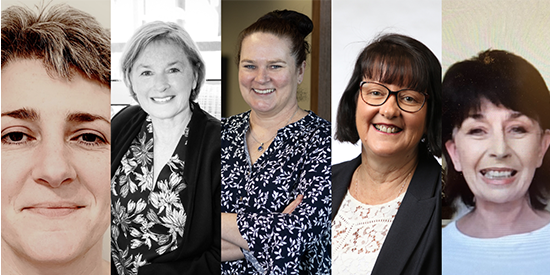Deakin awarded $8 million to tackle some of Australia's biggest health priorities
Research news
Deakin University projects are set to transform Australians health outcomes, from endometriosis care to a new screening test for insulin-resistance, thanks to more than $8 million from the latest round of Medical Research Future Fund (MRFF) grants and partnership funding.
The projects are from Deakin’s Institute for Physical Activity and Nutrition, Institute for Health Transformation’s Quality and Patient Safety Centre and Centre for Social and Early Emotional Development (SEED-Lifespan).
They include:
A person-focused supportive endometriosis care model
Professor Antonina Mikocka-Walus will lead a five-year project, ‘CoDeEndo: Co-Designing, evaluating, and implementing supportive care for endometriosis’ ($1,470,988.82).
More than 800,000 Australian women live with endometriosis, a chronic condition that occurs when tissue similar to the lining of the uterus grows elsewhere in the body. Many can experience extreme pain, intense cramps, fatigue and other symptoms.
‘Our project is evaluating the efficacy and cost-effectiveness of CoDeEndo – a novel telehealth-based supportive care program for endometriosis,’ Professor Mikocka-Walus says.
‘This work has massive potential to revolutionise endometriosis care in Australia.’
Partner organisations including Western Sydney University, Jean Hailes for Womens Health, Western Alliance and Endo Help Foundation contributed over $172,000, cash and inkind, to support this project.
More effective treatment for chronic pelvic pain
‘Chronic pelvic pain syndrome costs Australia up to $22 billion annually and impacts 10-20% of Australians,’ Professor Mikocka-Walus says.
She has also received $1,300,459.86 in funding to undertake a novel clinical trial examining the impact of e-hypnotherapy on the pain and mental health of people living with chronic pelvic pain syndrome.
The project, titled ‘Randomised e-hypnotherapy for Chronic Pelvic Pain Syndrome Trial (REST)’, will also support under-resourced patients, like those living in regional areas, and take an inclusive trial approach involving women, men, trans and non-binary people.
Partner organisations including the University of South Australia, Swinburne University of Technology, Western Alliance, Pelvic Pain Foundation of Australia, Chronic Pain Australia, Endo Help Foundation, Pain Australia Limited contributed over $231,000, cash and inkind, to support this project.
Cutting-edge online portal for cancer patients and carers
Nearly 30,000 Australians will be diagnosed with an upper gastrointestinal cancer each year – which can affect the pancreas, liver, stomach, bile duct and oesophagus.
Professor Trish Livingston will co-lead a three-year project with Professor Victoria White, titled, ‘iCare – An interactive online portal to improve health and wellbeing for people living with complex cancers, and their informal carers: a Phase II randomised controlled trial’ ($826,731.86).
‘There is a growing body of evidence to suggest targeted, supportive care can lead to improved quality of life and reduced health care costs across the community,’ project co-lead Professor Livingston says.
‘Our project will test the feasibility and acceptability of iCare – a first-of-its-kind tailored, interactive web-based portal – to help deliver meaningful health impacts for people living with upper gastrointestinal cancers and their carers’.
Partner organisations, including the Department of Health, Cancer Support, Treatment and Research Unit, VIC, Peter MacCallum Cancer Centre, Barwon Health, Cancer Council Victoria and Pancare Foundation, have contributed over $812,000, cash and inkind, to support this project.
People with insulin resistance to benefit from new screening test
Insulin resistance has been recognised as a significant precursor to type two diabetes, heart disease and stroke.
Professor Michelle Keske and team are developing a new low-cost, easy to perform diagnostic test to assist doctors to screen for insulin resistance.
She will lead the three-year project, ‘Early detection of insulin-resistance with a mixed meal challenge – the REFINE study’ ($1,498,740.60), to test the screening method.
‘Detecting people in the community with insulin resistance can help doctors inform patient care and prevent people from developing chronic diseases, like type two diabetes, heart disease and stroke’, Professor Keske said.
Partner organisations including Sanitarium Health and Wellbeing and Canberra Health Services have contributed over $76,100, cash and inkind, to support this project.
Boosted heart failure care for vulnerable Australians
‘Heart failure is a life-threatening disease, marked by frequent hospitalisations and low survival rates. Over 25% of heart failure patients are re-hospitalised within 30 days of discharge,’ says Professor Andrea Driscoll.
She will lead a four-year project, ‘SAFE-HF - tranSlating heArt Failure guidElines into practice: a RCT of a Nurse Practitioner primary care service’ ($1,488,730.44).
This world-first trial will determine the effectiveness of a heart failure nurse practitioner role in primary care. It will have a significant impact on patients with potential to reduce hospitalisations and save lives.
Partner organisations including Eastern Health, Western Health, Monash Health, Australasian Cardiovascular Nursing College, Department of Health VIC, Australian College of Nurse Practitioners, Australian Primary Care Nurses Association, Austin Health and National Heart Foundation have contributed over $286,000, inkind, to support this project.
The MRFF is a $20 billion long-term investment supporting Australian health and medical research. It aims to transform health and medical research and innovation to improve lives, build the economy and contribute to health system sustainability.
Share this story

Key Fact
Deakin University researchers have been awarded $8 million in Medical Research Future Fund (MRFF) projects.
